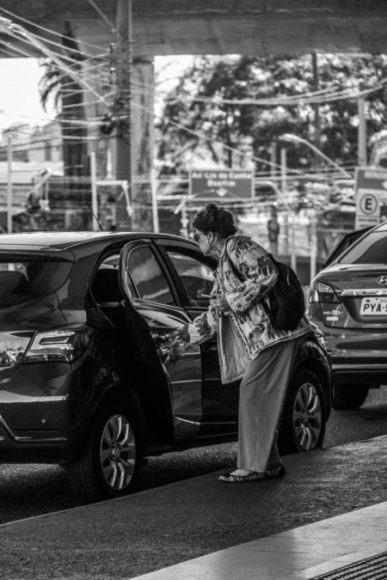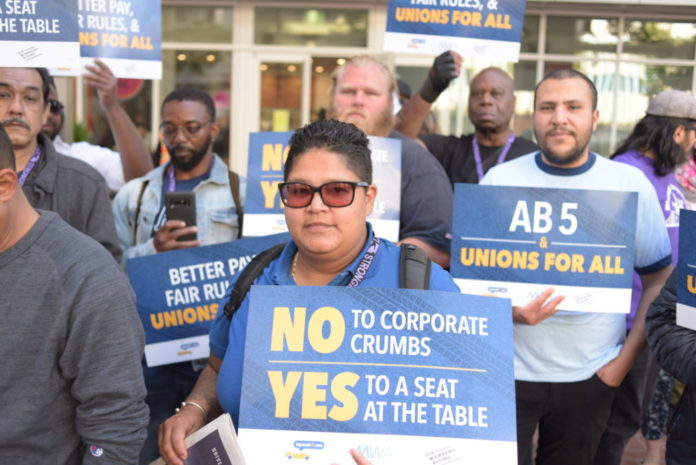Assembly Bill 5 (AB-5) is a controversial law working its way through the California state legislature which defines the legal standards for employees and independent contractors within the state. Uber and Lyft drivers are rallying in support of the bill because they feel it will offer them better working conditions and job security.
Lorena Gonzalez, D-San Diego, introduced Assembly Bill 5 in December of 2018. Currently it has been passed by the California Assembly and is being debated in the California Senate.
Dynamex Operations West, Inc. v Superior Court of Los Angeles is an important court case which set the legal standard guiding the passage of AB-5. In that previous case, the California Supreme Court ruled that Dynamex Operations West, Inc.’s employees were illegally classified as independent contractors. The provisions of AB-5 put this previous ruling into effect as California state law.

Uber and Lyft Drivers Take their Demands to the Streets
On Friday, July 19th, a modest group of around 40 Uber and Lyft drivers from across California gathered outside Uber’s San Francisco headquarters to support AB-5. This follows a similar event organized in the California state capital of Sacramento on July 10th.
These political actions were spearheaded by two community action groups known as Gig Workers Rising and the Mobile Workers Alliance. Each of these groups is fighting to ensure gig economy workers such as those employed by ride sharing services such as Uber, Lyft, and Waymo have stronger labor protections under U.S. state and federal law.
In the run-up to the protests at Uber HQ, Gig Workers Rising and Mobile Workers Alliance placed an advertisement in the SF Chronicle with an open letter to Uber CEO Dara Khosrowshahi, and Lyft co-founders Logan Green and John Zimmer. Despite elevating tensions, the letter largely praises the ride hailing and sharing services for their continued commitment to their drivers.
Debating the Future of Ride Hailing in America
In the letter, the organizations advocating on behalf of the drivers write:
“It’s time for Uber and Lyft to use the same innovation that made their businesses a verb in daily life to do right by us. That means extending all drivers the living wages and basic workplace protections we deserve. It also means an end to putting the cost and the risk of doing your business on us. Most importantly, it’s time for California’s leaders to give us the ability to bargain through a strong, democratic, driver-led union. We insist on a seat at the table immediately as these discussions are taking place and a meeting to discuss drivers’ core demands.”
The Uber and Lyft drivers want to have a place at the negotiating table and the ability to organize and collectively bargain. Though it is unclear of how lawmakers and businesses will inform their future decisions with these concerns in mind, at this time it seems like these wishes are not falling on deaf ears.
In response to the letter and demonstration at Uber HQ, a Lyft spokesperson released the following statement:
“Lyft is advocating for an approach in line with the interests of our driver community, by modernizing century old labor laws that make it difficult to provide both flexibility and benefits. That’s why we’ve been working with lawmakers and labor leaders on a different solution, so drivers can continue to control where, when, and how long they drive. It’s encouraging that more groups are joining the conversation to preserve flexibility for drivers while also providing new benefits and protections.”

Uber and Lyft Claim to Stand Behind their Drivers
Uber affirmed their support for their drivers:
“We will continue to work collaboratively with our diverse community of drivers — and the legislators who represent them — to improve the quality and security of independent work.”
Linda Valdivia, a representative of the Mobile Workers Alliance and signatory of the open letter enthusiastically rallied the drivers gathered in front of Uber HQ:
“We the drivers support AB5 and a union. Don’t let anyone tell you differently,” she said. “We the drivers are only getting stronger and our voices are getting louder. It’s time for Uber and the other rideshare companies to meet with us — we’re ready.”
An Uncertain Future
Across the United States and around the world, consumers are increasingly turning to car sharing and other associated services. In 2019, the global ride sharing market is valued at $183.7 billion and is expected to grow at 11.6% between now and 2023.
Many of the world’s top automakers have projected a complete breakthrough in autonomous driving capability within the next 5 years. As a result, it seems very unlikely that gig economy positions such as driving for companies like Uber, Lyft, Waymo and other international competitors will be sustainable in the long-run.
These realities are not lost on business leaders or government officials. As a result, while the passage of laws such as AB-5 may be heralded by its supporters as a victory, it seems like it could very well be tenuous and short-lived one.
Source: CBS SF Bay Area , Ratchet and Wrench
